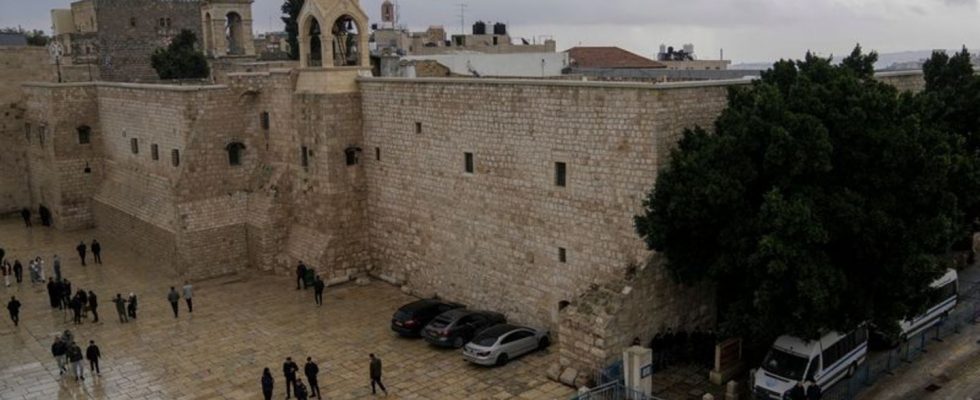War in the Middle East
War Christmas in the Holy Land: More duty than joy
The Church of the Nativity in Bethlehem is traditionally considered the birthplace of Jesus. photo
© Mahmoud Illean/AP/dpa
Given the horrors of the Gaza war, many Christians don’t feel like celebrating this Christmas. Bethlehem with the Church of the Nativity is deserted, while people continue to die in the Gaza Strip.
“Behold, I bring you good tidings of great joy that will come to all the people; for to you is born this day a Savior.” These words from the Christmas story in the Gospel of Luke are likely to resonate with many Christians in the Middle East and beyond in view of the horrific images of the Islamist Hamas attack on Israel and the Israeli military offensive Gaza Strip is difficult to come by. For some, Christmas this year is more of a chore than a celebration.
“The atmosphere is very sad. Nobody feels like celebrating because of the war in Gaza,” said Anton Siniora, a Christian from Jerusalem, to the German Press Agency. “We didn’t even put up a Christmas tree this year. Only a few families did so to at least give their children a little joy,” he added.
Bethlehem, with the world-famous Church of the Nativity south of Jerusalem, is also a sad, deserted place this Christmas. In the church, under whose altar there is the grotto in which, according to tradition, Jesus Christ was born more than 2000 years ago, midnight mass will also be celebrated this Christmas.
No Christmas decorations
The city, where tens of thousands of pilgrims from all over the world usually crowd at Christmas, is deserted because of the war and Israel’s lockdown. The large Christmas tree that used to stand in front of the Church of the Nativity during Advent is missing. The heads of the churches in Jerusalem had already decided in November that there should be no Christmas decorations in the Holy Land because of the war.
“It’s not just a sad Christmas, it’s also an economic catastrophe,” said George Rishmawi, a Bethlehem resident. “The Israeli occupation has stifled the economy. Because of the city’s closure, no one can enter or leave the city without a pass,” he said. Bethlehem is under siege. In addition, public employees would no longer receive salaries because the Palestinian Authority, which administers parts of the West Bank, no longer has any money.
Nobody can go to work in Israel anymore, there are no tourists and sales of the famous Christmas souvenirs made of olive wood are almost zero. “It’s sad, and instead of going to Manger Square in front of the Church of the Nativity like every Christmas, I’ll stay at home,” said Rishmawi. “Everyone feels this way about the killing in Gaza,” he added. He has never seen Bethlehem so bleak, even during the corona pandemic. And no one wants to meet the Latin Patriarch of Jerusalem, Cardinal Pierbatista Pizzaballa, because everyone is annoyed that he met with Israeli President Izchak Herzog.
Christians are only a very small minority
Pizzaballa, as the highest representative of the Catholic Church in the Holy Land, completed the traditional Christmas procession from Jerusalem to Bethlehem in the morning. However, he was accompanied on the car journey by only a few believers and a few Franciscans. As every year, the procession began at the Jaffa Gate in the historic Old City of Jerusalem and ended at the Church of the Nativity.
In the Holy Land, Christians only form a very small minority: around 1,000 Christians live in the Gaza Strip, out of a total population of around 2.2 million. In Israel, Christians make up almost two percent of the approximately 10 million citizens. In the West Bank it is around 1.5 percent of the approximately 3.2 million Palestinians.
French President Emmanuel Macron telephoned Pizzaballa and assured him of France’s continued solidarity. Macron expressed great concern about the dramatic situation of the Latin Church in Gaza, where hundreds of civilians of all denominations have sought refuge and have been living under attack for months.
Hope for an end to the deaths in the Gaza Strip
Despite the generally subdued mood, Palestinian President Mahmoud Abbas expressed hope in a Christmas message that the Christian festival would bring an end to the deaths in the Gaza Strip. However, there were no signs of this. Abbas emphasized that the Palestinians continue to fight for their right to their own and sovereign state.
The war was triggered by the worst massacre in Israel’s history, carried out by terrorists from the Islamist Hamas and other groups on October 7th in Israel near the border with the Gaza Strip. More than 1,200 people were killed. Israel then began massive air strikes and, since the end of October, a ground offensive in the area. According to the health authority controlled by the Islamist Hamas, more than 20,400 people have now been killed.

